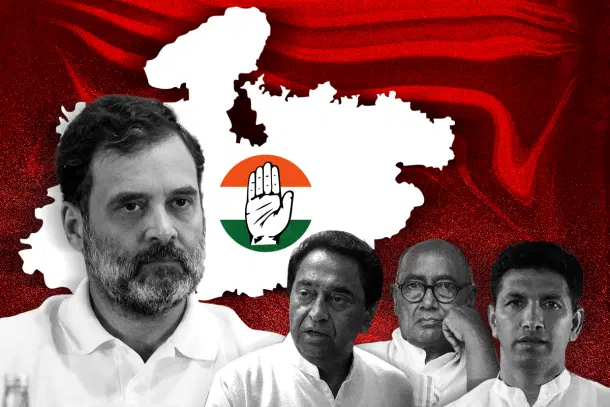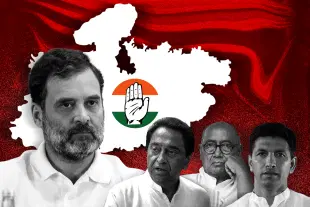States
How Congress' Ambitious Overhaul Fell Flat In Madhya Pradesh As Factionalism Won
Nishtha Anushree
Aug 20, 2025, 12:42 PM | Updated 12:43 PM IST
Save & read from anywhere!
Bookmark stories for easy access on any device or the Swarajya app.


The Congress party's major organisational overhaul plan, termed as Sangathan Srijan Abhiyan (organisation creation campaign), appears to have faltered in Madhya Pradesh (MP).
After the list of 71 newly appointed district presidents was released on Saturday (16 August), protests broke out at several places and many leaders tendered their resignations.
While a degree of discontent after organisational appointments is expected, since every aspiration cannot be accommodated, what is noteworthy here are the substantive reasons for this dissatisfaction.
The district presidents' appointments display everything that Congress leader Rahul Gandhi had promised they would not be when he launched the Sangathan Srijan Abhiyan (SSA) in Bhopal on 3 June.
Gandhi's primary focus had been on sidelining inactive leaders and removing those allegedly linked with the Bharatiya Janata Party (BJP), giving prominent posts to grassroots-level leaders, adopting a bottom-up approach, and suppressing factionalism.
However, the list that arrived two and a half months after these assurances reflected what a typical Congress list has traditionally contained: leaders connected with senior figures secured positions, while grassroots workers were left out.
This discontent was voiced by workers from Dindori, Dewas, Burhanpur, Satna, Ujjain (Rural), Indore, Bhopal, Guna and Dhar. Resignations followed in Rewa, Indore, Dewas and Burhanpur.
High-Profile Appointments
Rahul Gandhi's assurances of empowering grassroots leadership ring hollow, as among the 71 district presidents, six are incumbent members of the Legislative Assembly (MLAs), and 11 are former MLAs, including three former ministers.
With sitting MLAs appointed as district presidents, concerns have emerged about how these leaders will balance organisational responsibilities with legislative duties.
Protests erupted over the appointments of MLAs Siddharth Kushwaha and Mahesh Parmar as district presidents of Satna and Ujjain (Rural), respectively.
Furthermore, many of these leaders are so senior that their appointments as district presidents are being viewed as a demotion. For instance, supporters of Raghogarh MLA and former minister Jaivardhan Singh protested against his appointment as Guna district president.
They alleged this was an attempt by state Congress president Jitu Patwari to sideline Singh, the son of former MP Chief Minister Digvijaya Singh, due to factional rivalries within the party. Singh, however, stated that he would follow the party line.
Similarly, former minister and Dindori MLA Omkar Markam's appointment as Dindori district president is being regarded by his supporters as an affront, as they call him the tribal chief minister of the state. Markam, however, has expressed his willingness to work in the new role.
With these appointments, Patwari's earlier assurance of giving district presidents a decisive role in ticket distribution also becomes ineffective due to conflicts of interest, since these leaders themselves will be contenders for tickets.
The Reappointments
Among the 71 district presidents, 21 have been retained, while 50 are new appointees. This has led to accusations that Rahul Gandhi’s appeal for creating a "new organisational structure" has been disregarded.
The strongest protest was witnessed in Bhopal, where district president Praveen Saxena was reappointed. A contender for the post and former district president, Monu Saxena, staged protests against the move, demanding nyay (justice) from Rahul Gandhi.
In Burhanpur, Rinku Tank was retained as city president. His appointment drew criticism from Hemant Patil, district spokesperson and president of the Rajiv Gandhi Panchayat Cell, who subsequently resigned from his positions.
Factional Divisions
Apart from rewarding already powerful figures such as sitting and former MLAs or incumbent district presidents, Congress leaders also appear to have used the organisational overhaul as an exercise to display their own clout.
As a result, the district president posts were distributed among factions loyal to former chief ministers Digvijaya Singh and Kamal Nath, state party president Jitu Patwari, former Union minister Arun Yadav, and senior party leader Ajey Singh.
For example, Kamal Nath ensured that his loyalists secured around 10 district president positions, including Chhindwara and Jabalpur, where the district presidents were repeated, and Rewa Rural, among others.
Similarly, the Digvijaya Singh faction obtained five important districts, including Rajgarh, which will now be led by his nephew Priyavrat Singh, a former MLA, and Guna, where his son Jaivardhan has been appointed.
Meanwhile, Patwari’s supporters retained influence in five major urban strongholds, most notably Bhopal and Indore, where both appointments triggered protests.
At some places where leaders close to these senior figures were excluded, their supporters also demonstrated. For instance, in Burhanpur, Arun Yadav's supporters held a closed-door meeting, and in Dewas, Patwari's aide Gautam Bantu Gurjar resigned from the party.
Consequently, instead of emerging as a united force after the organisational overhaul, the Congress party appears more fragmented, with each faction attempting to capture as many posts as possible.
Weak Appointments
It is also alleged that in at least 15 districts, individuals were appointed as presidents who had not even sought such positions. This raises doubts about how committed they will be to their roles if they had no interest in them to begin with.
A Congress worker from Morena, Ayush Agrawal, told Swarajya, "We got a district president who neither staked claim for the post, nor was his name mentioned when the observers were gathering our responses."
He explained that instead of having a strong district president, Congress leaders chose a person who will act as a compliant subordinate, rather than question or challenge them.
Another concern is that in many places where the Congress attempted to induct fresh faces, it failed to select the genuinely popular ones and instead appointed individuals unfamiliar even to party workers.
One such case is Satna City, where Arif Iqbal Siddique has been appointed president. It is alleged that even local leaders are hearing his name for the first time. The Youth Congress chief mocked the appointment, publicly asking for his contact details.
Thus, the appointments contradict Patwari's earlier claim that district presidents would be chosen on the basis of popular choice, rather than the preferences of a few leaders.
A third issue is that even with the organisational overhaul, Congress has not fully managed to remove BJP-leaning individuals from its fold. It is alleged that nearly a dozen of the newly appointed presidents remain in indirect contact with the BJP.
The central challenge for the MP Congress has been the infiltration of BJP workers or BJP ideology among its ranks. Despite Rahul Gandhi's emphasis on removing these "BJP agents," the party has failed to achieve this.
What Matters
Despite these shortcomings, Congress has succeeded in fulfilling its promise of balancing caste equations in these appointments. More than half of the positions have gone to members of underrepresented communities.
The party has appointed 12 district presidents from Other Backward Classes (OBC), 10 from Scheduled Castes (SC), eight from Scheduled Tribes (ST), and three from minority groups.
While these appointments are proportionate to the demographic composition of the state, former state spokesperson Ashfaq Ahmed resigned from Rewa, citing inadequate representation of Muslims.
Meanwhile, with four women appointed as district presidents, Congress has made its highest-ever female appointments, indicating the party’s intent to increase women’s representation in politics.
However, these symbolic representations will not help the party if the organisational overhaul fails to meet the fundamental objectives of strengthening grassroots leadership and removing inactive, BJP-leaning and faction-driven leaders.
A Congress worker from the state told Swarajya, on the condition of anonymity, "SSA began with a great vision. We were involved in the process of organisational overhaul. But the results are contrary to our expectations."
"This is a superficial SSA. At some places, there are even allegations that money was exchanged to secure posts. Factionalism dominated the process. It became about leaders' preferences, not workers' choices," he added.
Thus, the Congress's organisational overhaul in MP did not turn out as envisioned and therefore cannot deliver the results the party hopes for in the 2028 Assembly elections.
Nishtha Anushree is Senior Sub-editor at Swarajya. She tweets at @nishthaanushree.





